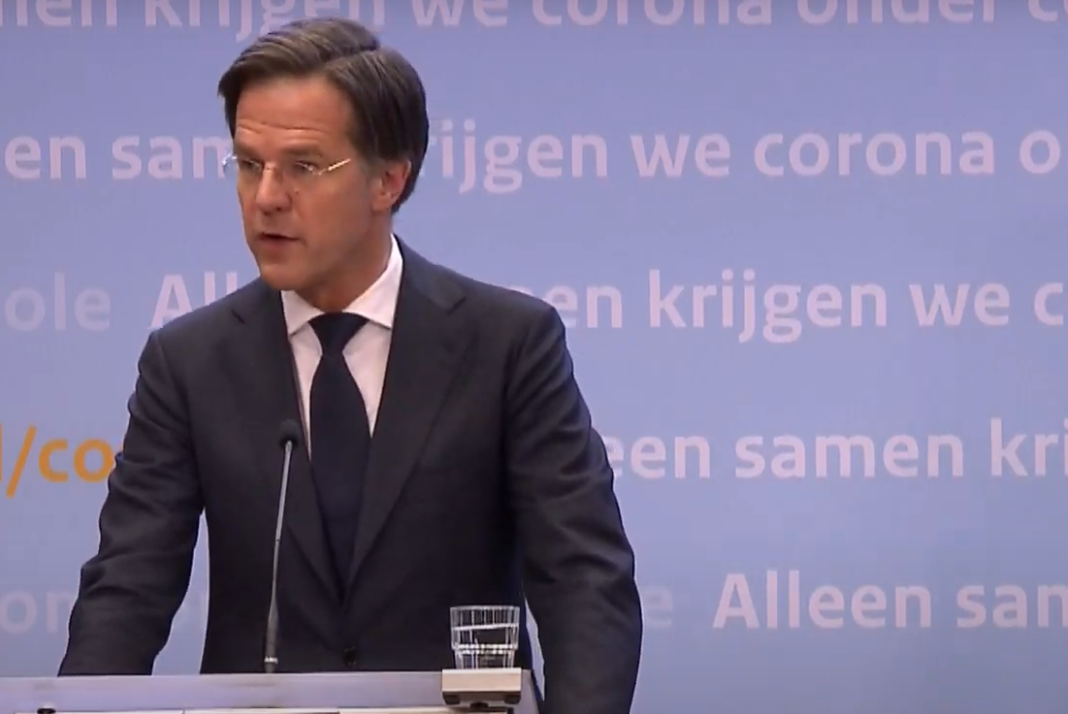In today’s press conference, Prime Minister Mark Rutte delivered the news we’ve all been anticipating: a curfew will be issued across the country — that is, if parliament supports it after a debate tomorrow. Home visits will also be reduced to one guest per day, and new travel restrictions will be implemented.
This announcement comes as the coronavirus figures in the Netherlands have started to gradually decline, but the more contagious new variant threatens to spread throughout the country at a rapid rate. “We need to counter that,” Rutte says. “We’re all tired, me too. But we need to counter it and we need to have some perspective for a return to normal life (which will happen).”
Curfew
“Nobody wants a curfew — but we’re getting it,” says Rutte. The plan is not technically official yet, as it still needs to pass in parliament. However, the Outbreak Management Team (OMT) has recommended a curfew and this is backed by the cabinet.
The curfew will be in place from the hours of 8:30 PM to 4:30 AM. It will be implemented within a few days of parliament approval (by Saturday, at the earliest) and last until at least February 9.
The restriction will apply to everyone but will make a few exceptions, such as for medical emergencies and essential work. People outside past curfew will need to carry a signed statement as to why they are outside, such as a letter from an employer. Any falsification will be considered an offence. Additionally, supermarkets and essential stores will have to close earlier.
“We will enforce the curfew,” says Rutte. “There will be a fine of €95 if you are caught. If you present a falsified document or something it’s fraud and you will be persecuted.”
The prime minister offers a couple of clarifications: “You can still walk the dog,” and food delivery workers are exempt from the curfew (you can still order takeout).
The (OMT) has said that they are optimistic that once the curfew is implemented, home infections should be reduced by 8-13%.
Reduced visitations
The prime minister also confirmed that the number of guests allowed in the home will be reduced from two to just one, effective immediately.
Earlier this week, health economist and epidemiologist Koen Pouwels explained that there is too much risk under the current measures allowing two guests per household “because, in theory, you can infect 14 people per week.”
Another effort to reduce person-to-person contact regards the number of guests permitted at a funeral, which will be reduced from 100 to 50. This measure takes effect from Monday, January 25.
Travel restrictions
Prime Minister Rutte also states that all incoming travellers will need to provide a negative PCR test upon arrival in the Netherlands AND a negative rapid test.
Additionally, the 10-day quarantine period will actually be enforced for incoming travellers, though the details are not yet clear. People with a positive test will also be legally obligated to stay in quarantine and not go out. Up until now, the Dutch government had issued “strong advice” for incoming travellers to quarantine but have now determined the need to tighten up.
Flight ban
The cabinet has investigated the feasibility of instituting travel bans to the Netherlands from the UK, South Africa, and South America, due to the high infection rates in these areas. They’ve determined that all air traffic to and from these countries will be grounded from January 23.
There are just a few exceptions to this rule: medical travel, repatriating Dutch citizens, and cargo.
De Jonge: “We need to do everything possible now.”
Health Minister De Jonge is extremely concerned about the new coronavirus variant. He says that in order to cope with this horrible threat, we need to secure the best “starting position” possible for when the more contagious variant becomes mainstream.
Although he delivers a sombre message, De Jonge is holding high hopes for vaccination programs, more testing, and tighter quarantines. He emphasises that increased testing will help with reopening schools again.
Vaccination
Some updates have been made to the vaccination plan for the Netherlands. Now, Pfizer’s second vaccination will be injected in the sixth week instead of the fourth. Additionally, there will be fewer limits on the required supply for the vaccines. The intention is that more vaccines will be readily available.
To stay up to date with all the latest coronavirus news in the Netherlands, follow DutchReview on Facebook.
Feature Image: DutchReview/Supplied




Can 2 households walk the dog???
Can 2 people from same household walk the dog??